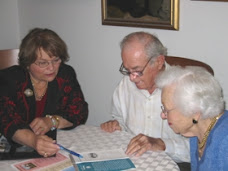Caregiving and when to know you need outside help is difficult to determine and caregivers have a hard time admitting they need that help. Caregivers often don’t recognize when they are in over their heads, and they normally get to a breaking point. After a prolonged period of time, caregiving can become too difficult to endure any longer. Short-term the caregiver may be able to handle it. Long-term, help is needed. Outside help at this point is considered necessary.
The common scenario with an overloaded caregiver frequently is as follows:
The common scenario with an overloaded caregiver frequently is as follows:
• 1 to 18 months - the caregiver is confident, has everything under control and is coping well. Other friends and family are lending support.
• 20 to 36 months - the caregiver may be taking medication to sleep and control mood swings. Outside help dwindles away and, except for trips to the store or doctor, the caregiver has severed most social contacts. The caregiver begins to feel alone and helpless.
• 38 to 50 months - Besides needing tranquilizers or antidepressants, the caregiver's physical health is beginning to deteriorate. Lack of focus and sheer fatigue cloud judgment and the caregiver is often unable to make rational decisions or ask for help.
At this stage family or friends intercede and find other solutions for care. This may include respite care, hiring home health aides or putting the disabled loved one in a facility. Without intervention, the "caregiver" may become a candidate for long-term care as well as the disabled family member.
It is important to note that hiring a professional caregiver can provide valuable ongoing support to an overloaded family caregiver. A professional care manager can guide the family and the caregiver through the maze of long-term care issues. The care manager has been there many times -- the family is experiencing it for the first time.
An elder law attorney can help iron out legal problems.
There are also cash benefits for Veterans, who served during a period of war, and their spouses, that pay for home care or assisted living.
If you are the one providing daily care for a loved one, your ailing family member would want you to seek help. Take care of yourself and your needs, both physically and mentally. Seek out professional help that will ease your burden and look for community service organizations that offer respite help.

